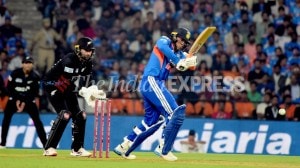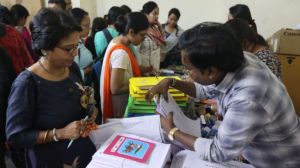TRAI sets conditions for pvt STD cos
DECEMBER 13: Telecom Regulatory Authority of India on Monday adopted a laissez-faire policy for privatising long distance services and sug...

DECEMBER 13: Telecom Regulatory Authority of India on Monday adopted a laissez-faire policy for privatising long distance services and suggested that a one-time entry fee of Rs 500 crore, revenue share of 5 per cent, a national level licence and a Rs 2,500 crore minimum networth requirement be imposed on private players wanting to tap the lucrative domestic long distance call market.
The Rs 7000 crore national long distance NLD market is slated to be opened for private participation from January 1, 2000. The government will now consider the panel8217;s recommendations while finalising the actual long policy.
However, the TRAI has not permitted quot;resalequot; of long distance services eventhough the new telecom policy of 1999 envisaged so. It has chosen to recommend that resale may be allowed only after 3 to 4 years of the opening up of the market. In addition, NLD service providers will not be allowed to set up STD PCO8217;s which will continue to be the domain of access providers like department of telecom services DTS, Mahanagar Telephone Nigam Ltd and private basic service providers.
The resale of services was a major demand of small and medium size business sector as it could allow any entity to buy bulk minutes from a bigger service provider and then retail the same to consumers. TRAI officials said that the decision was taken due to fears of quot;unregulated fall in STD tariffs which could result in chaos in the market.quot;
Telecom Regulatory Authority of India chairman Justice SS Sodhi said that the entry fee would be a two-step transaction involving payment of Rs 100 crore non-refundable portion in cash and securitisation of Rs 400 crore in the form of bank guarantees BGs or investments in government bonds. He added that the authority felt that market dynamics should determine the number of national long distance operators NLDOs.
These funds will be released in favour of the licensee subject to phased completion of the network roll out. Accordingly, a licensee will be paid back Rs 100 crore on completion of phase I, with a further Rs 100 crore and Rs 200 crore being released at the end of the second and third phase respectively. Any shortfall in meeting the rollout targets would result in forfeiture of the incentive.
The authority has also suggested that the government may levy a differential service tax, over and above the 5 per cent revenue share imposed on the service provider.
TRAI has also recommended that the entry fee and revenue-sharing conditions be applicable to the department of telecom services DTS. Besides, it has recommended a structural separation and accounting separation of long distance segment of the DTS.
The licence period has been fixed at 20 years with an option to extend it by 10 years. On the number of players to be allowed, there were differences in opinion among the seven-member body, with one member recording his view for only two new players for the first five to seven years, while the majority favoured no restriction free competition.
TRAI has recommended only national level licences in order to ensure adequate build up of infrastructure. A multiple tier system with regional and local operators might not offer optimum solutions, the TRAI felt. The NLDO will also be allowed to carry intra-circle traffic.
It will also be mandatory on all access providers to provide interconnection to the private NLD operators so that a consumer has a variety of operators to choose from while making long distance calls. Similarly, access providers will have to ensure that at every STD-PCO, consumers have are given the choice of selecting any NLD operator for his long distance call.
Interconnection shall, however, be mutually negotiated by the service providers subject to review and intervention by the TRAI. It has also recommended that infrastructure providers like Railways and Power Grid be allowed to set up NLD operations on the condition that they provide services through a separate legal entity and fulfill the selection criterion.
Fixed service providers FSPs may also be given the facility of providing intra-circle long distance service to subscribers of other FSPs within their service area. Facilities based competition has also been recommended in the initial phase of NLD market liberalisation. NLDs may also lease infrastructure and bandwidth from infrastructure providers.
The free competition policy with open entry has also been recommended in the provision of infrastructure. Category I infrastructure companies providing dark fibre, right of way, duct space, towers and buildings etc. need not be licenced. Category II infrastructure providers making available bandwidth may be licensed on simplified terms and conditions.
- 01
- 02
- 03
- 04
- 05































